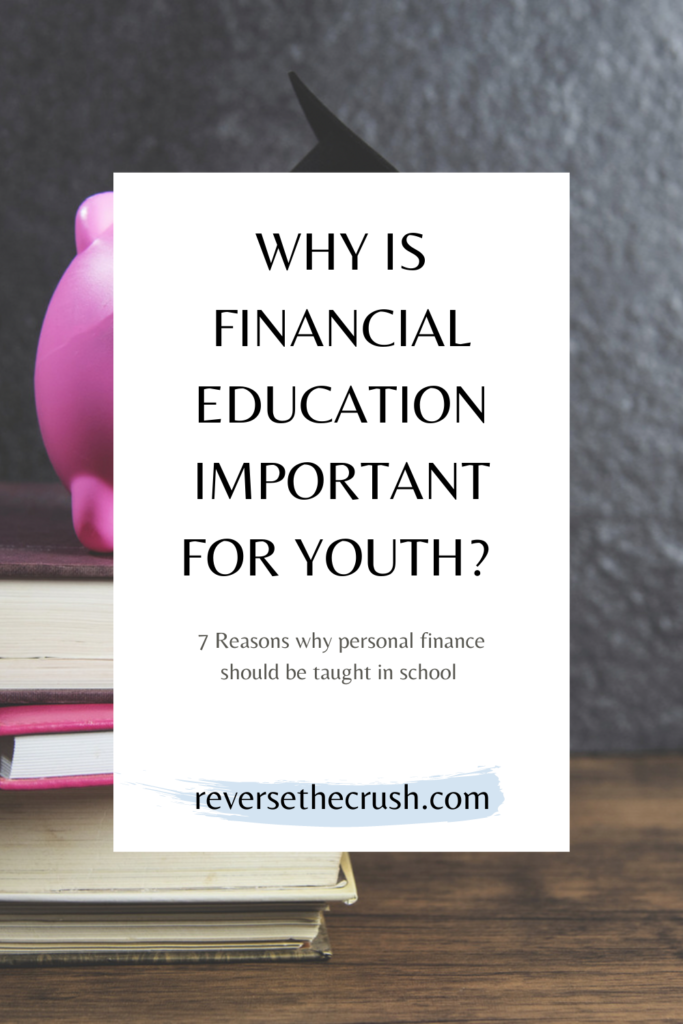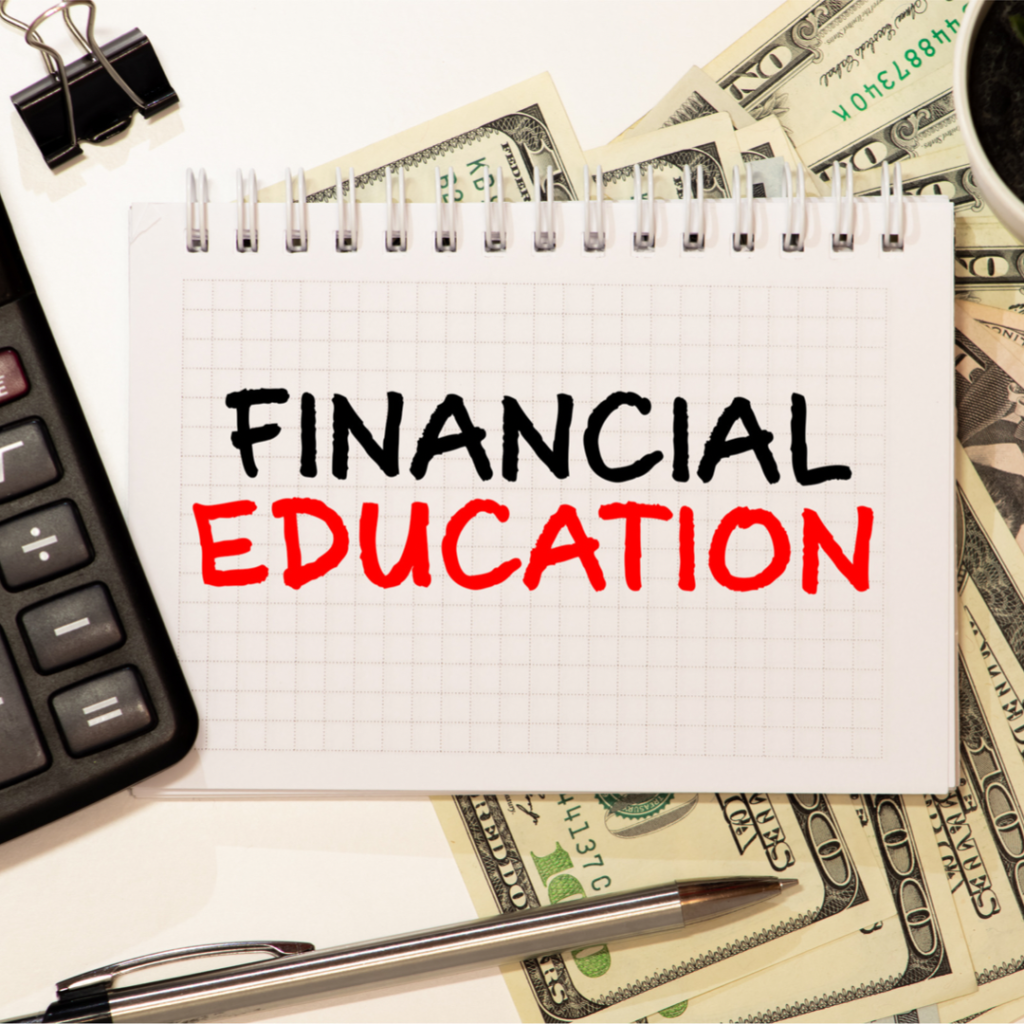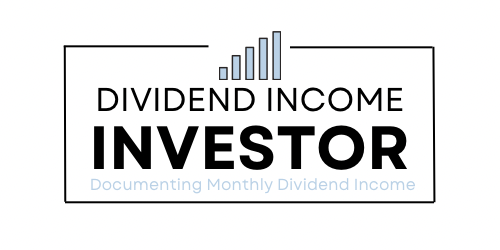Why is financial education important for youth? Here are seven reasons why personal finance should be taught in school. I am not a licensed investment advisor and this post is not investment or financial advice.
Sometimes I can’t help but feel resentful towards my education.
I mean, I was forced to waste so much time on subjects that didn’t interest me.
What’s worse is that I had to learn things that I never use in real life.
But worst of all, school never provided a financial education.
The curriculum taught every kind of math except for personal finance, which is probably the most important kind of math of all.
But why is financial education important for youth?
In this post, I aim to show you seven reasons why financial education is the most important education of all.
Let’s dive in.
Why Is Financial Education Important For Youth?

Why Is Financial Education Important For Youth?
Financial Literacy Should Be Taught In Schools
How is it even possible that financial literacy is not taught in schools?
If school is really about teaching basic life skills and preparing children for adulthood, then personal finance should be one of the most important parts of the curriculum.
Of course, there has been some progress on this matter.
According to the Globe And Mail, some Ontario high schools began implementing personal finance in 2020.
But there is still a lot of progress to be made.
If you have ever worked in customer service for a bank, you quickly realize that many people don’t even know how to send an e-Transfer or pay a bill online.
Furthermore, the average person doesn’t even understand how credit card interest is charged. Many don’t realize you must pay off a credit card every month by the due date to avoid interest.
The bottom line is that financial literacy is extremely important.
Why Is Financial Education Important For Youth?
Here are seven reasons why financial education is important for youth:

1. Personal Finance Skills Are Important Regardless Of The Career
It doesn’t matter if you make $250,000 per year or $40,000 — personal financial skills matter, regardless of the career.
Plenty of high income earners are massively in debt.
In some cases, earning more income can lead to a worse financial situation, because lenders are willing to hand out more loans.
Without a proper financial education, many adults end up spending more than they earn.
A solid understanding of money helps adults avoid spending more than they earn.
2. To Avoid Financial Mistakes & Debt
Personally, I had to learn how to not make financial mistakes the hard way.
I didn’t have any financial education to build a foundation upon.
In order to learn about money, I had to make mistakes with it.
Although I began working early in life, around 15, I didn’t save much. I even racked up credit card debt when I got my first credit card.
And then I signed up for a $23,000 student loan without even thinking about the consequences.
By the time I got out of school, I had a negative net worth and was further behind in life than when I started.
In short, a solid financial education could have helped me avoid some of my early financial mistakes.
Related: How To Dig Yourself Out Of A Financial Hole
3. Learn How To Budget
Again, it doesn’t matter how much money you make if you don’t know how to budget.
As such, every youth should be taught how to budget money.
They should learn how to track expenses and income, how to pay yourself first, and why it’s important to live below your means.
Related: How To Budget — 7 Simple Steps To Build A Successful Budget
4. To Understand The Cost Of Debt
Simply put, most people don’t understand the cost of debt.
Some people believe ignorance is bliss, so they choose not to look at their debt.
Frankly, it’s easy to get used to debt as a normal part of life. The education system encourages student loans. Adulthood encourages car loans. And our internet-connected world promotes spending and living lavishly. As a side note, I honestly question if some people want to do what they’re doing or if they just want to spend money to have something to post on Instagram.
Anyways, I think people would spend a lot less if they truly understood the cost of debt.
If students were taught how to calculate credit card interest and how long it will take them to pay off, would they spend the same? I don’t think so.
Related: Student Loan Debt: 11 Practical Ways To Quickly Pay If Off
5. Understand Investing & Compound Interest
I didn’t learn about investing or the power of compound interest until I was in my mid twenties.
If I had of learned about it by age 18, I would have already been financially independent by now.
Understanding investing and compound interest at an early age would have changed my destiny.
I would have viewed every dollar I earned differently. I honestly question if I would have even went to school if I learned about dividend investing sooner.
Hence why I strongly believe investing should be taught to youth in school.
Instead of being bored out of my mind while learning how to play a recorder, learning about investing early could have provided something to work towards from an elementary school level.
From my perspective, entrepreneurial minded youth often get overlooked in school. They’re looked at as fidgety or lacking effort because the education system is catered to creating cogs.
Perhaps inserting investing into the curriculum would peak their interest and keep them from being bored out of their minds.
Related: How Much Will I Have If I Save $200 A Month?
6. To Properly Plan For Life & A Suitable Career
In my view, school does an incredibly poor job of preparing youth for the real world.
In short, there isn’t enough discussion about careers, how much jobs pay, and what life would look like in those careers.
Imagine a class that provided a detailed overview of what working in a particular career was like. And then imagine students were told the salary of the jobs they were interested in and taught how to budget that salary.
Wouldn’t that offer invaluable insight on what they could expect to afford down the road?
Furthermore, what if students were taught about the cost of a mortgage? What if they were advised on the best careers for them to obtain the exact lifestyle they desired?
Instead of taking a generalized approach to teaching, I believe it would be better to reverse engineer backwards from the desired career.
This way, students who plan on becoming a banker don’t have to waste time learning basic biology or chemistry. Those classes can be taught to the kids who want to become scientists or doctors.
7. To Know Financial Independence Is Possible
I never knew financial independence was possible until after school.
I thought I would have to work until 65 like everyone else.
Since most careers are abominably boring, I dreamed of unrealistic careers. I imagined becoming a BMX biker or clothing company owner. Frankly, those careers are less realistic career paths than becoming financially independent through investing.
If I only knew that financial independence was a possibility earlier in life, I could have made more realistic choices.
Money Management Activities For Youth
So why is financial education important for youth?
Hopefully the seven reasons listed above make it clear.
Of course, the issue is that personal finance education is still limited in the education system.
Fortunately, there are still money management activities that parents can teach youth.
For instance, parents could pay an allowance for chores and teach kids how budget the money.
Or parents could teach their children to start investing early so they learn about compound interest.
Best of all, parents could lead by example and be very open about their finances.
Personal finance does not have to be a taboo subject. In my opinion, it should be talked about around the dinner table.

Why Is Financial Education Important For Youth?
In summary, financial education is important for youth and personal finance should be taught in school.
Here are the seven reasons why financial education is important:
- Personal finance skills are needed in any career
- To avoid financial mistakes and debt
- Learn how to budget
- To understand the cost of debt
- To understand investing and compound interest
- Plan for life and a suitable career
- To know financial independence is possible
If personal finance was a priority when I was in school, I firmly believe that I would already be financially independent. I also would have avoided many financial mistakes.
Hopefully personal finance can continue to become a more important part of the education system going forward.
Similar Posts On Personal Finance To Check Out
How Much Will I Have If I Save $200 A Month?
How To Dig Yourself Out Of A Financial Hole
Pay Yourself First: How To Pay Yourself First
How To Save Money As A Teenager
Student Loan Debt: 11 Practical Ways To Quickly Pay If Off
I am not a licensed investment or tax adviser. All opinions are my own. This post may contain advertisements by Monumetric. This post may also contain internal links, affiliate links to BizBudding, Amazon, Bluehost, and Questrade, links to trusted external sites, and links to RTC social media accounts.
Connect with RTC
Twitter: @Reversethecrush
Pinterest: @reversethecrushblog
Instagram: @reversethecrush_
Facebook: @reversethecrushblog
Email: graham@reversethecrush.com


 What Is A Good Rate Of Return On Investments?
What Is A Good Rate Of Return On Investments?
